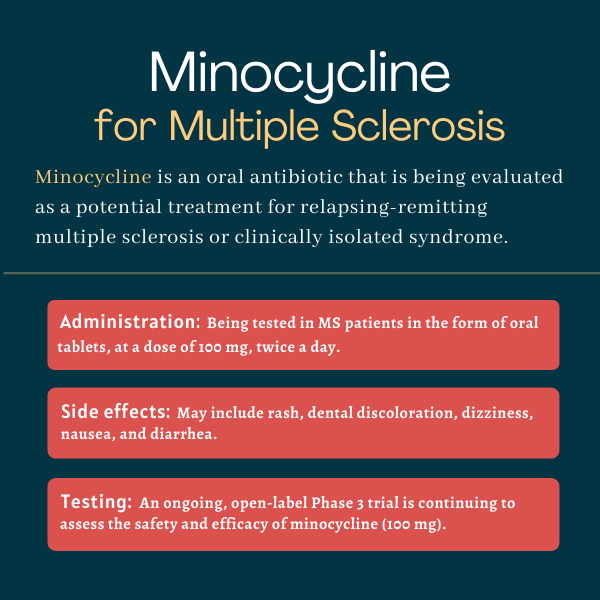FAQs about minocycline in MS
Minocycline is an antibiotic that is also believed to have anti-inflammatory and neuroprotective effects. It is being evaluated in clinical trials in relapsing-remitting multiple sclerosis and clinically isolated syndrome. Results have shown that it may help slow disease progression and reduce relapses in MS patients by lowering disease-associated inflammation and subsequent nerve cell death.
Minocycline has shown promising results in MS Phase 2 and Phase 3 trials. These results may encourage the launch of additional studies to confirm the antibiotic’s benefits in relapsing forms of MS. It may still take several years before a potential approval is granted by the U.S. Food and Drug Administration.
Based on animal data, minocycline is not recommended for use during pregnancy due to possible fetal harm. People of childbearing age should use effective contraception while on this medication. Patients should talk with their healthcare provider if they become pregnant, plan to become pregnant, or are breastfeeding or plan to do so while on minocycline.
In clinical trials in multiple sclerosis patients, the earliest signs of minocycline’s effects were reported at six months. In one small trial involving 10 patients with relapsing-remitting MS, the treatment significantly lowered the number of inflammatory lesions by 84% at six months. In a larger trial, called MinoCIS, the antibiotic also significantly lowered the proportion of patients converting from clinically isolated syndrome to clinically definite MS at six months.
Hair loss and weight gain have not reported as side effects of minocycline in clinical trials for multiple sclerosis, but hair loss is mentioned as a common side effect of minocycline in other indications. Patients should talk with their healthcare team if such events occur.
Related Articles

 Fact-checked by
Fact-checked by 






